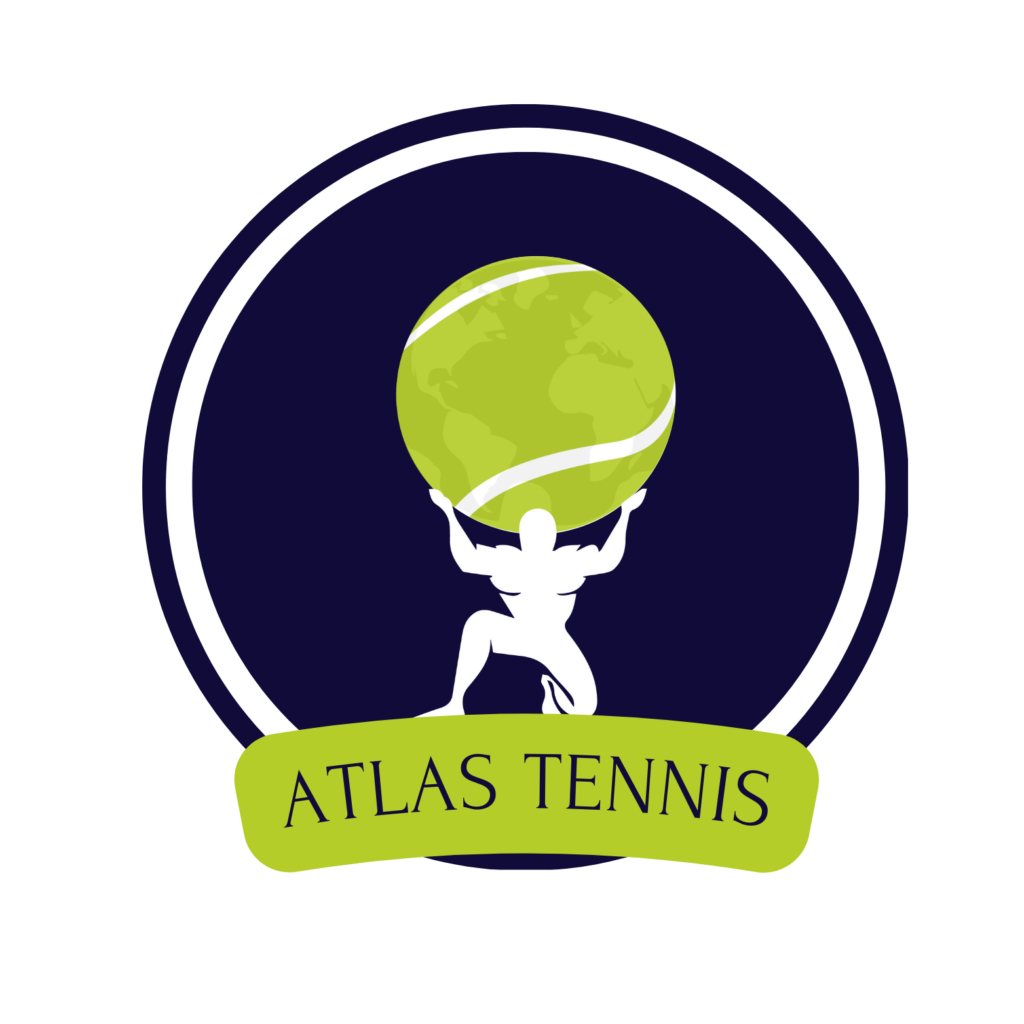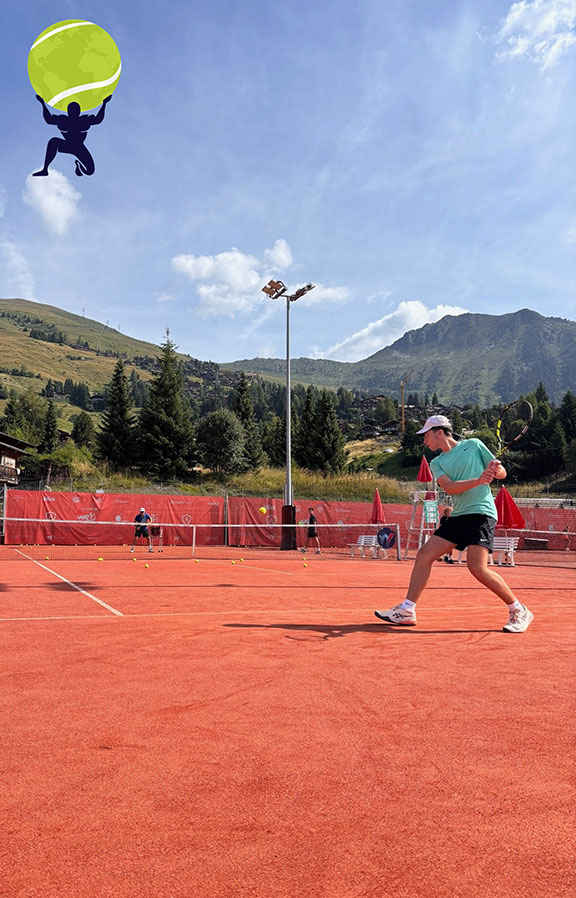Picture this.
You walk off the court after a tough match at one of the many junior tennis tournaments you play. There were some very tough line calls, over the top celebrations of your errors, and as you sit down in the club lounge, your opponent is 10 feet away from you with their parents, loudly talking about how bad they played, despite winning. And now you’ve got a long, quiet car ride home.
Sound familiar? If you play junior tennis tournaments, some type of experience like this is inevitable.

European tennis clubs are simply nice places to play!
As unpleasant as it can be, don’t get us wrong—there are still SO many positives to gain from playing tournaments, and even the less-than-ideal experiences are important and valuable to go through. We encourage our players to compete in tournaments, knowing full well that sometimes they can honestly, for a lack of better word, stink.
Now, imagine a similar scenario where you come off the court after a tough battle. But instead of some indoor tennis club with a faint smell of old coffee and elevator music in the background, you are outdoors on the French coast, with the smell of the sea in the air. And instead of ignoring you after a terse handshake at the net, your opponent asks if you’d like to hang out for a bit and if they can buy you a bite to eat or something to drink. You also have a new group of friends around the club that you’ve been traveling with, happy to talk about the match, or about anything else, too.
This is what it’s like, more often than not, playing tournaments in Europe with Atlas Tennis.

It’s difficult to describe what makes European junior tennis tournaments so much different from the ones in the US. It’s even harder to do without using relying on my favorite word to capture the overall feeling: vibes.
There is a certain vibe often associated with junior tennis tournaments in the US. It’s cold, pressure-filled, and unfortunately always not fun. You end up at the same clubs, playing the same people, with some parents and coaches that are just a little too involved.
In Europe, the tournament vibe is generally friendlier and much more social and welcoming.
But what does that actually mean? Why are the vibes so much better at European junior tennis tournaments?
- They are happy to have us! It’s a big deal for the clubs we visit to have a group of players that traveled from across an ocean to play there! There is so much excitement for us to be there, and it feels great to often have the red carpet rolled out for us.
- The clubs really care about running great tournaments. Generally speaking, tournaments are a point of pride for the entire club. Usually, everyone—pros, staff, members—will get involved in one way or another—either by playing (there are often lots of different age divisions), watching, helping to organize, or just coming by for dinner at the club restaurant.

Even the local pets love watching junior tennis tournaments in Europe
- This brings up another awesome feature of European tennis clubs—they basically all have restaurants! You never have to worry about rushing out to get a sandwich between matches, as is so often the case back home. Trust me, playing a tournament where you aren’t running to Panera, Jimmy John’s or Subway for a sad turkey sub is such an underrated upgrade.
- One of the best traditions in tennis: the winner buys the loser a drink/snack. It’s so simple. Spend 10-15 minutes after you play sitting with your opponent chatting and getting to know each other. It completely changes the emotions and tension that can occur as players come off the court. In my experience, this is most firmly entrenched in the tennis etiquette of Holland, but I’ve seen it elsewhere too. I could write an entire post about why it’s such an awesome tradition!
- Most tournaments have off-court events for players and club members. It’s typical for clubs to have special dinners, BBQs, bingo nights, trivia, and other events in conjunction with tournaments. And summer 2024 should be particularly fun for us with different viewing parties, as the clubs will have Wimbledon on the TVs all day as well as the European Football (Soccer) Championships, where all of the countries we visit will have their national teams competing!
- The tournament structure helps create more competitive matches. Since long before UTR existed, the French Tennis Federation has been using their own rating system, “classement” that helps create tournaments where players are competing against others at a similar level. The Dutch Federation has a similar system, and as a result, players are more likely to compete against others at their level (and if they win, they keep facing better players). European tournaments often also have opportunities to compete in multiple draws (i.e. you can play in the 16 & under and 18 & under at the same time), meaning the chances to play lots of matches are way higher.
- Losses don’t sting quite the same way when you’re on a European summer trip. Don’t get me wrong, losing is not fun, and we’re not trying to sugarcoat it. But just how losses can hurt a little more when you’ve got a long car ride home, they also hurt a little less when you are in the midst of the trip of a lifetime, with coaches to help you learn, new friends to hang out with, amazing sights to see, and likely a bunch of additional matches to play.

The Vibes at Junior Tennis Tournaments in The Netherlands are Unmatched
I don’t want our positive outlook on European junior tennis tournaments to make it seem as though we are anti USTA tournaments. Atlas Tennis loves the USTA and will always encourage our players to compete and participate. But here’s the thing: you can do it all!
Our hope is that players that have already been competing in USTA tournaments, UTR events, and high school tennis decide join us for 3 weeks in Europe, get exposed to different environments, clubs, players, and more, have the time of their life, and then come back home excited to play more tournaments with an improved game and an expanded perspective.

European Tennis Clubs are often right in the center of town and a part of the community
In our eyes—having been in this world of junior and college tennis—there is very little to lose by going over to play tournaments and train in Europe, and so much to gain. We’re absolutely biased given all of us behind Atlas Tennis have had extensive experience traveling through Europe for tennis, but I think that bias is also the exact reason why Atlas exists. We believe in what our trips can provide for our players, and want to give them the opportunity to see for themselves.
Have more questions about what exactly makes European tennis tournaments different? Want to know more about Atlas Tennis? Send me an email and let’s talk! ben@atlas.tennis
–Ben



